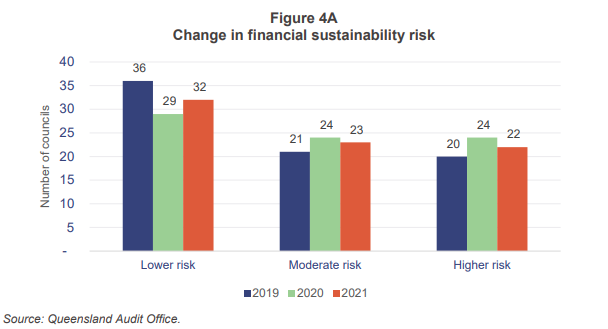
There are signs Queensland councils are recovering from the financial toll of Covid-19, but more than half remain at risk of not being financially sustainable.
A report into local government by the state’s audit office says the financial sustainability of the sector has improved ‘marginally’ over the last year and councils are beginning to recover.
But financial sustainability remains below pre-pandemic levels with approximately 60 per cent still at a moderate or high risk of not being financially sustainable.
Despite this 35 councils were able to generate an operating surplus in 2020-21, an improvement on last year and consistent with results before the pandemic.

“Councils are recovering from the financial impacts of the COVID-19 pandemic,” the report says.
“For the 2020–21 financial year, 35 councils generated an operating surplus. As a result, fewer councils are at a moderate or high risk of not being financially sustainable.
“Although this is encouraging, 45 councils are still at either a moderate or a high risk of not being financially sustainable.”
High risk issues still unresolved
The report finds an improvement in councils’ controls over financial systems and processes, but says most ‘high risk’ issues still haven’t been resolved after more than a year. In all, 47 councils had at least one significant deficiency.
The audit identified 86 ‘significant deficiencies’ that still had to be addressed since the last audit, especially around asset management and valuations, as well as continuing problems with risk management and procurement and contract management.
Forty-five councils didn’t have sufficient controls in place to protect their information systems, with the most common weaknesses having to do with system access.
“Councils should ensure their staff have an appropriate level of access to information systems to perform their role within the organisation, but no more than that,” the report recommends.
Lack of internal audit systems
The report says fifteen councils didn’t have an audit committee, and 12 were in breach of the legislation with regard to internal audit requirements. In all, 20 councils didn’t have an audit committee function at June 30 2021.
“As at 30 June 2021, there are still 15 councils that did not have an audit committee. In addition, two councils had audit committees that did not meet during the year, and three councils had committees that met only once.
“Councils who met less than twice during the year did not meet their minimum requirements under the legislation.”
Financial statements still lagging
The audit office also found councils are tardy in certifying financial statements, with only 36 councils having their statements certified two weeks prior to the October 31 deadline.
It makes a number of recommendations, including that all councils should review their asset management plans to identifty future funding needs, and should enhance liquidity management by reporting unrestricted cash expense ratios and unrestricted cash balances in monthly financial reports tabled at council meetings.
At the time of reporting the auditor had certified all but two of the state’s 77 councils.
See how your council’s financial performance compares to others here.
Comment below to have your say on this story.
If you have a news story or tip-off, get in touch at editorial@governmentnews.com.au.
Sign up to the Government News newsletter